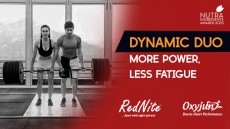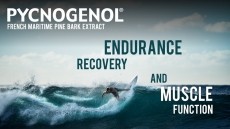Study: Masters athletes do not meet required nutrient levels during championships

Researchers from Canada, the U.S. and Germany analyzed the dietary intakes reported by a group of athletes who participated in a range of sporting events at the 2022 and 2023 World Masters Athletics Championships, an international competition for athletes 35 years of age or older.
Published in the journal Nutrients, the study reported that carbohydrate intake was below the recommended levels for endurance athletes, and protein intake was below recommended levels for all athletes, except for female power athletes.
Other nutrient intakes below the recommended levels included vitamins D and E, calcium, potassium, vitamin A (except for female endurance athletes), folate (except for female power athletes), vitamin C for female endurance athletes, vitamin K and fiber for males and zinc for endurance athletes.
"This indicates that more support might be needed for the athletes when traveling to a foreign location for competitions," the researchers concluded. "This study is unique in that it is the first study to analyze intakes of specific macro- and micronutrients in male and female masters athletes involved in world championship athletic competitions."
Analyzing nutrient intake
The study evaluated 24-hour dietary recalls provided by 43 athletes (16 females and 27 males, mean age 59.2 ± 10.3 y) participating in endurance (n = 21), sprint (n = 16), jumping (n = 2), multi-component (n = 3) and throwing (n = 1) events during the outdoor (Tampere, Finland, 2022) or the indoor (Torun, Poland, 2023) World Masters Athletics Championships.
The recalls were analyzed using Food Processor Software (ESHA Research, USA), which produced an estimate of daily energy, macronutrient and micronutrient intake.
Descriptive statistics were calculated as means and standard deviations (SD) for energy intake, macronutrients and micronutrients for male and female endurance and power athletes, and descriptive results were compared with current recommended values.
Low macros and micros
Carbohydrate intake averaged around 3.2 g/kg/d in the endurance sport athletes. Sport nutrition guidelines recommend intakes of 5 g to 7 g/kg/d of carbohydrates for athletes training at moderate intensity for one hour per day and intakes of 6 g to 10 g/kg/d for athletes training 1 to 3 hours per day at moderate to high intensities.
Protein intake was lower than recommended for all athletes studied, except for the female power athletes. Most recommendations for masters athletes involve protein intakes of 1.5 g to 1.6 g/kg/d, especially when energy intake is low (as with the athletes in this study), in order to preserve lean tissue mass.
Omega-3 fatty acid intake was relatively low. An intake of about 3 g/day of omega-3 and an omega-6-to-omega-3 ratio of 4 or less is recommended for masters athletes for the prevention of inflammation and the stimulation of muscle protein synthesis.
The athletes consumed a number of important micronutrients below the recommended levels. Calcium and vitamin D intakes were well below guidelines for all athletic groups, and vitamin K intake was below guidelines for males.
Of particular note for endurance athletes, intakes greater than those in nutrition guidelines of about 2,000 mg/d calcium and 1,500 IU/d to 2,000 IU/d vitamin D are effective for protecting against fatigue fractures.
Adequate calcium intake is important for all athletes for optimal muscle contraction and nerve conduction, and vitamin D may be important for stimulating muscle protein synthesis. Vitamin K is important for proteins that inhibit osteoclast activation (i.e., cells involved in bone resorption) and promote bone mineralization.
Many of the athletes had low intakes of antioxidant micronutrients including vitamins A, E and C in female endurance athletes and zinc in male and female endurance athletes. These micronutrients are needed for the preservation of immune function and the prevention of oxidative damage of cell membranes, especially in endurance athletes whose training elicits high rates of oxygen consumption. Zinc is also important for energy metabolism, muscle contraction and low intake is associated with reduced aerobic power.
Other micronutrients consumed below the recommended levels included folate (except in female power athletes) and potassium. Folate facilitates red blood cell production from bone marrow while low plasma levels of potassium are predictive of muscle and whole-body fatigue.
The proportion of endurance athletes consuming the recommended levels of vitamins B1 (important for energy metabolism) and B6 (important for immune function) and iron (supports oxygen delivery to muscles) were relatively low as well.
The authors did note a potential limitation of any analysis of dietary records is the underreporting of dietary intake by participants. It is estimated that underreporting with 24-hour recalls is about 8% to 30%.
However, even after assuming that dietary intake was underreported by the upper amount of 30%, intakes of vitamin D, E and A in males, zinc in male endurance athletes, and carbohydrates and calcium in endurance athletes would still be below the recommended levels in these studied athletes.
Source: Nutrients
https://doi.org/10.3390/nu16040564 (registering DOI)
"Dietary Intake of Athletes at the World Masters Athletics Championships as Assessed by Single 24 h Recall"
Authors: Taylor P.M. Leonhardt et al.












